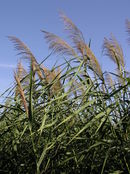Biological Invasions (2017) 19, 1547-1563
From Pestinfo-Wiki
Revision as of 16:07, 27 August 2017 by Bernhard Zelazny (Talk | contribs)
 | Selected publication you are invited to contribute to the discussion section (above tab) |
Patterns and mechanisms of invasive plant impacts on North American birds: a systematic review
Biological Invasions 19 (5), 1547-1563
Abstract: Understanding how invasive plants affect biodiversity is a crucial conservation need. Numerous studies examine impacts of invasions on birds, but trends in these effects have not been synthesized. We reviewed 128 studies from North America to quantify the frequency of positive, negative, and neutral (non-significant) effects of invasive plants on avian ecology, and then evaluated support for proposed mechanisms of impacts. Our frequency-based approach enabled us to draw value from the full breadth of available literature, including articles that do not provide information necessary for meta-analyses and articles examining understudied phenomena. Total avian abundance and prevalence of individual bird species were usually unaffected by invasion, with 48.9 and 57.2% of tests showing neutral results, respectively. Avian richness decreased with invasion in 41.3% of tests. Although birds often preferred nesting in invasive vegetation (45.0% of tests), effects on nest survival were typically neutral (57.9%). Multiple metrics (e.g. body condition, fledgling survival) have received scant attention. Some of the patterns we highlight differ across ecological contexts, emphasizing the need to understand impact mechanisms. Several studies have directly linked invasion impacts to altered nest-site availability, habitat heterogeneity, and food supplies. There is mixed evidence that plant architecture impacts nest-site selection and nest predation. Our review highlights the nonuniform consequences of biological invasions. The high frequency of reported neutral effects suggests that invasions often have minimal impacts on birds, but positive and negative impacts certainly can arise. Managers considering eradicating invasive plants for avian conservation should monitor impacts locally to determine whether eradication will be beneficial.
(The abstract is excluded from the Creative Commons licence and has been copied with permission by the publisher.)
Link to article at publishers website
Database assignments for author(s): James R. Miller
Research topic(s) for pests/diseases/weeds:
environment - cropping system/rotation
Pest and/or beneficial records:
| Beneficial | Pest/Disease/Weed | Crop/Product | Country | Quarant. |
|---|